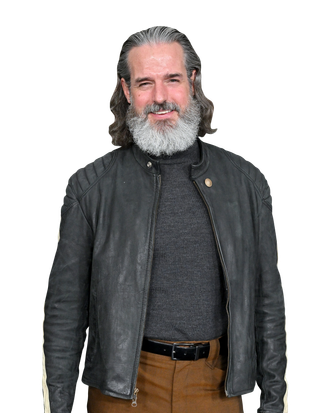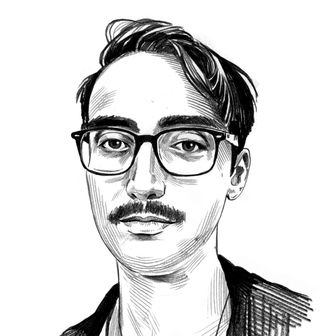
When Jeffrey Pierce first read for the role of Joel in the 2013 video game The Last of Us, it wasn’t meant to be. But creative director Neil Druckmann and his team were so impressed by Pierce’s audition that six months later, they called him up to offer him the role of Tommy, Joel’s brother, a major supporting character in both the game and its sequel. Alongside Troy Baker and Ashley Johnson as Joel and Ellie, Pierce’s voice and motion-capture performance as Tommy became arguably his most famous role.
When it was announced that Druckmann would be teaming up with Craig Mazin to make The Last of Us into a TV series, Pierce had the opportunity to play a new, original role unique to the adaptation: Perry, a rebel fighting FEDRA in Kansas City alongside the resistance’s leader, Kathleen (Melanie Lynskey). Both characters are introduced in violent, vengeful fashion in this week’s episode, “Please Hold to My Hand,” but Pierce cautions that when it comes to The Last of Us, “You have to be very careful about when you decide someone is good and when you decide they’re bad. There’s very rarely a guy in a white hat and a guy in a black hat.”
How were you approached about appearing in the TV series?
Neil is a friend, and I knew that there had been a lot of different iterations over the years. Having seen Chernobyl, I knew as soon as Craig was on that they were going to do something special. My window to play Tommy closed in live-action probably about a decade ago, so I knew that wasn’t going to happen, but I said to Neil, “Look, if there’s any way that I can support what you guys are trying to create, I’ll be there in a heartbeat.” I was lucky that something came up that fit.
What was it like to watch Gabriel Luna’s portrayal of Tommy, and to see this character that you’ve played before?
It was incredibly gratifying. I think that Gabriel did an amazing job of paying tribute to the character that we created for the games. When I say “we,” I mean 50 people touched that role before I ever picked up a script and auditioned for it — and then after I left the stage, 200 or 300 people created Tommy’s performance. Gabriel came in and honored that performance, which is humbling. My daughter looked up at me and said, “Dad, he sounds just like you!” [Laughs.] It’s like, yeah, he does, but then he brings all of himself and all of his life and history to it.
As someone who loved the game, seeing the events play out onscreen is really fascinating. I’m amazed seeing all the abandoned cityscapes and the scenery rendered in live-action.
Seeing it rendered practically when I was on set was jaw-dropping. Every detail that you see onscreen in the show, I would say 70 to 80 percent of it is practical effects. They’re not fixing it in post. The crew in Calgary was made up of people who were massive fans of the game before they got the job. And so that was really special to walk into. Cynthia Ann Summers’ work on the wardrobe — every extra looks like they came out of the game. It’s a level of detail and perfection that is really rare, even today in prestige television.
How directly did you collaborate with Neil, in both the game and the show?
On the game, Neil is there for every moment that I’m onstage working. And we don’t have to talk a lot, which I like. We just sort of have an understanding of what we’re after in the material. But for the show, they gave me some bread crumbs and then they were like, “Okay, we’ll see you in seven months.” So I really had the opportunity to say, Okay, what do I want to do? What do I want to accomplish with this part? What do I need to do to prepare? I really was able to do that on my own and then run ideas by him, and then sort of filter that through to Craig and episode director Jeremy Webb and get a response, and they said, “Yeah, run with it,” which is everything you want to hear as an actor. No one was like, “No, man, that’s not going to fucking work. Whatever you do, don’t do that.” We sort of speak a common language creatively, and I just intuitively get what he’s after.
We’ve only seen Perry in a couple scenes so far, but what can you say about what you brought to the character?
There’s a lot that remains to be revealed in terms of who he is. I think that he meshes a lot with the themes that exist in the show, as seen in the relationship between Joel and Ellie, the relationship between Bill and Frank, and the idea of having found your purpose within this new world. One of the things that was described in Craig’s script was that maybe he was in the military, so I just kind of ran with that: This guy was a professional before the outbreak, and then was able to use those skills as he sort of wandered, and then found his purpose with Kathleen and the fight against FEDRA.
He seems like he’s loyal to Kathleen, but might be skeptical of some of her methods.
I think that he’s the one person who’s in any position to question her because he’s an expert at what he does. But that loyalty is also covered by his love and affection for her. We can make some bad decisions when love is involved, and I think that’s one of the themes of The Last of Us.
What are Kathleen’s goals in this anti-FEDRA resistance?
Kathleen is driven by what I think is a reasonable and yet extreme desire for revenge, because of what happened in Kansas City. The idea that she is the villain takes away all the shades of gray that exist within the situation. As more and more is revealed about what took place, I think that one of the great things that Neil and Craig do is they ask the audience, “What do you think you would do? What’s the right decision, what’s the moral decision, what’s the philosophical decision, and then what’s the practical decision that you would make as a person? Would you choose vengeance or not?” I think it’s an interesting and powerful story to tell, and to force the audience to ask, “Okay, who’s the villain here and who’s the good guy?”
Both your character and Kathleen are not named characters in the game. What does expanding their roles in the show do?
You’d have to do 12 more hours of gameplay to fit in Perry and Kathleen’s story. The opportunity to drop into that world and to give context to everything else that’s happening is really great. In the game, you don’t get any sense of what’s happening for the other key characters in that journey; you just know to escape. But exploring that can only be done in this sort of short-story-telling method.
Any hints about what exactly lurks under the floor in that storage room?It is not a seismic disturbance in Kansas City, I can say.
When you first started on the game, did you foresee it leading to all this?
It’s interesting to talk about 12, 13 years ago, sitting around at the table read and then going onto the stage and shooting the death of Sarah. It had an emotional impact on everyone on that soundstage, whether they were a technical operator or operating the camera or the production assistants. We were all just blown away and in tears. That’s a rare, rare moment, when that chord is struck and you find lightning in a bottle. I turned to Neil after that, and I said, “There are going to be 15-year-old boys all over the world standing in front of their TVs weeping 20 minutes into playing this game.” And it got a good laugh, but it wasn’t intended in a facetious way. Then, when the game came out, that’s exactly what everyone was saying on Twitter.
I’m an optimistic person. If you asked me 13 years ago if this would happen, I would’ve said, “Fuck yeah, probably! That’s as probable as anything.” The story is so simple and well told. It’s not surprising that this is what Craig and Neil have achieved, that 21 million people are watching these episodes. And I love that it’s powerful enough to hit me, even though I know what’s coming. Great art is there to trigger emotions. It’s there to make you uncomfortable. It’s not necessarily there to soothe you. If it’s done with a sort of passion and point of view, it should force us to look in the mirror and ask, What part of my humanity was revealed by my response to that?
This interview has been edited and condensed for clarity.
More From This Series
- The Last of Us Reminds Us It’s In Fact a Scary Show
- 68 TV Shows We Can’t Wait to See in 2025
- So … What Will the 2025 Emmys Look Like?


